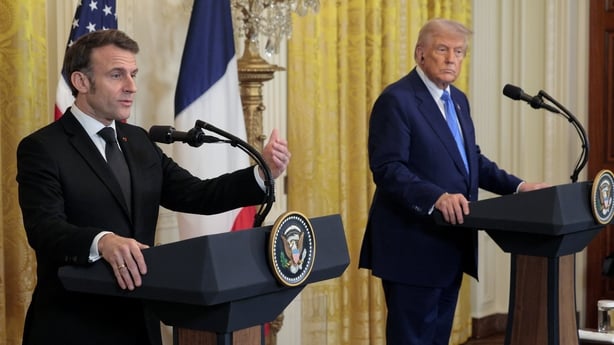When British Prime Minister Keir Starmer announced his plan to increase defence spending yesterday, it took many by surprise.
And yet, in many ways, it didn't.
"I think in our hearts of hearts, we've all known that this decision has been coming for three years, since the beginning of the conflict in Ukraine," he told a press conference.
The UK government had already committed to increasing defence spending to 2.5% of GDP. However, it was yet to give a timeline. That was to be delivered after the completion of a strategic defence review in the spring.
Instead, Mr Starmer decided to press ahead with that announcement before the review was concluded.
Why jump ahead? The broad consensus across Westminster yesterday was that he couldn't show up to the White House tomorrow empty handed.
However, his promise is still far short of the defence expenditure US President Donald Trump has called for - 5% of GDP. Instead, he will arrive with a commitment to reach 2.5% by 2027.
While below expectations, it's still seen by many as a clear statement of intent. Should the UK achieve this target, it will be among seven of the 32 NATO members spending 2.5% or more, according to the latest NATO estimates.
Poland is the largest spender, committing 4.1% of its GDP to defence. Other countries with significant budgets include the US and Estonia, both spending around 3.4% of GDP. Latvia and Greece are estimated to have spent 3.1%.

NATO General Secretary Mark Rutte has called on members to spend north of 3% of their GDP on defence.
It's a target the British Prime Minister has committed to reaching in the next parliament, should he still be around.
In the meantime, achieving 2.5% will mean a further reduction in the UK's foreign aid budget from 0.5% of gross national income to 0.3%. It's a decision many backbenchers and charities have criticised.
Save the Children described it as a "betrayal of the most vulnerable children".
Keir Starmer accepted that it wasn't a decision he wanted to make but argued that conflict would result in further "migration and poverty".
"The realities of our dangerous new era mean that the defence and national security of our country must always come first," he told reporters.
Asked if he was a Prime Minister on a war-footing, he stopped short of repeating such language, instead describing the situation as a "significant moment".
The Prime Minister’s announcement to increase defence spending will not guarantee a warm reception from President Donald Trump tomorrow but Downing Street hopes it will help.
On Monday, French President Emmanuel Macron visited the White House, the first European leader to do so since Mr Trump's inauguration. It’s something some people saw as a slight snub to Mr Starmer.
However, it also allowed Mr Starmer to observe from afar.
Yesterday he spoke with Emmanuel Macron by phone. The official read-out from Downing Street made no mention of a discussion around "Trump-tactics" but it did state that the two leaders "reflected" on the visit.
As Keir Starmer boards his plane later today, he knows that he faces a difficult balancing act between maintaining warm relations with Mr Trump but also defending the European position on Ukraine.







